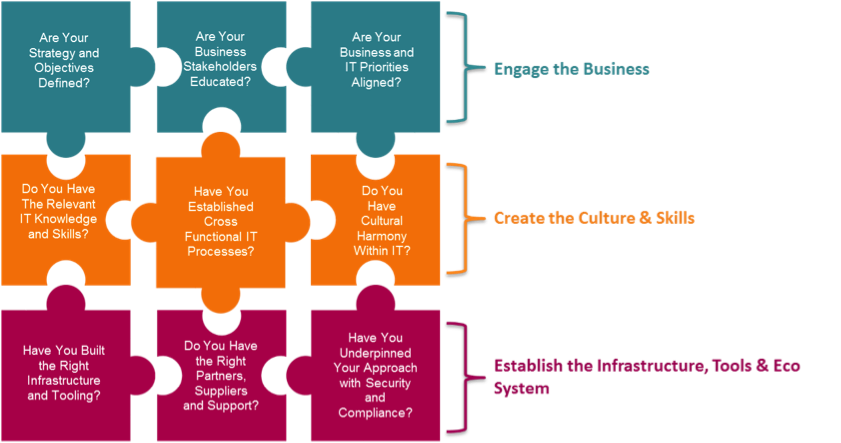One of the biggest issues with DevOps is achieving a clear definition. After all, without a clear definition how can we possibly attain the status of a ‘DevOps Shop’. The crucial aspect of DevOps, and one that is missed by so many people, is that it is not an objective, but rather it is a state of organisational mind. Throughout this series of blogs, we have constantly referred to DevOps as a philosophy and, as with any philosophy, DevOps is simply a set of guiding principles which, if adopted, become the philosophy of the organisation over time.
The issue with changing a philosophy within an organisation is that it invariably takes time and, because every organisation is different, the change required is different. DevOps as a philosophy cannot have a clear definition and yet the implementation of a philosophy in an organisation requires clear objectives to provide clarity of vision for those driving the change. Thus, many organisations are faced with a conundrum that many have struggled to resolve.
Taking DevOps as a single monolithic ‘thing’ and attempting to implement it is unlikely to result in any success but examining the philosophy from a variety of perspectives allows any organisation to understand which elements of the philosophy they need to adopt and to what extent adoption is required for success. At a high level, DevOps can be viewed as a three pronged approach that requires a change in how the business is engaged, how the skills and processes are embedded in the philosophy of the organisations and how the relevant infrastructure, tools and eco system are established.
Organising the philosophy of DevOps into three sub elements allows a further sub division to allow us to achieve a granular view of DevOps which permits us to measure core elements and establish both an overall view of an organisation’s maturity and a roadmap to attain the required level of maturity.

It is important to be able to analyse DevOps into definable elements that can be easily measured as this allows identification of where augmenting an organisation can help emphasise the philosophical change that is required. The most effective approach to philosophical change in an organisation is the ability to break the change into small identifiable units that allow incremental change to be applied. Small changes are easier to implement and tend to stick and then further small changes may be applied.
The Attenda view is that an initial exercise to establish the level of maturity required in each of these nine areas allows the production of a programme of change across the nine areas to establish an effective DevOps philosophy within any organisation. Roadmaps detailing the change programmes can be produced and show where external assistance can be used to enhance te speed and efficiency of change within an organisation.
Article by channel:
Everything you need to know about Digital Transformation
The best articles, news and events direct to your inbox
Read more articles tagged: Featured






